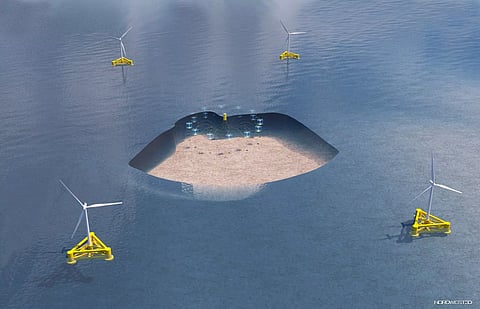

Illustration of Subfarm's submersible fish farm design, located between offshore floating wind turbines.
Image: Subfarm.
A new collaborative project between Norwegian and Swedish partners aims to develop fish farming within a floating wind farm located 40km off the Swedish coast.
Freja Offshore, a joint venture of Hexicon Group and Mainstream Renewable Power, is collaborating with Norwegian submersible aquaculture technology firm Subfarm on a project to install fish farming pens between floating wind turbine platforms.
The offshore wind farm is planned to be constructed off the coast west of Lysekil in Sweden.
"Seafood and offshore wind power are two industries that Sweden will need more of in the future, not least to strengthen preparedness. That is why we want to find ways to combine these two pieces," said Magnus Hallman, CEO of Freja Offshore, in a press release.
The plan is for the submersible fish pens to be placed between the platforms of the wind turbines, anchored with their own anchoring system. The pens will be lowered to a depth of 50–70 meters and hoisted up to the surface for checks and harvesting, before being transported by ship to land.
The Norwegian partner in the project, Subfarm, has been working since 2018 on solutions for sustainable fish farming inside offshore wind farms.
Subfarm points out that the technology has been developed to cope with tough weather conditions in the North Sea and is based on methods previously used in the oil and gas industry for decades. The entire system is operated from a control station on land.
Sustainability is a key factor in the development, the partners say.
"Sustainability is a common thread in everything we do. We work with a technology that minimizes the environmental impact and puts the well-being of the fish at the centre," said Karl C Strømsem, chairman of the board of Subfarm.
"By co-locating with wind power, we can further reduce the ecological footprint because much of the infrastructure is already in place," he added.
According to Freja Offshore, Sweden's Västra Götaland region needs to triple its electricity production in the coming years to meet the energy needs and offshore wind will play a key role - and the reef-like conditions between the platforms also provide a good opportunity to develop fish farming alongside electricity production.
For the local coastal area of Lysekil in Sweden, economic development and job creation are also key motivators for the project.
The partners hope that the collaboration will boost local opportunities and entrepreneurship in the construction and design of fishing gear, service vessels, fish processing and increased demand for marine technology.
"We are facing a major transition in which electrification has a decisive role. To succeed, we must think anew and see what opportunities wind power can mean for our development as a coastal municipality. That's why it's extra exciting to be part of this project," said Anne Bergeld Gunnäs, a maritime business developer in the municipality of Lysekil.
Other collaboration partners in the project are the Lysekil Municipality, the research institute DHI and the Norwegian industrial cluster Blue Maritime Cluster.
